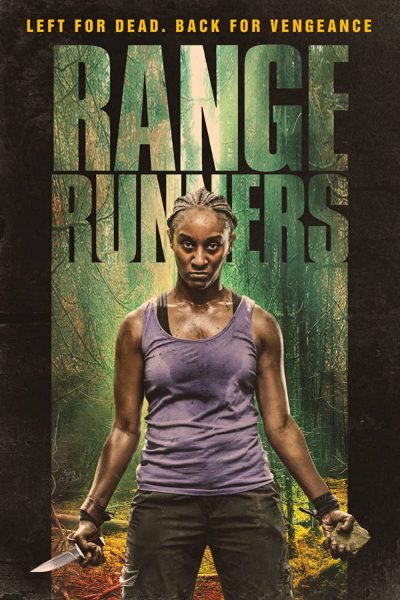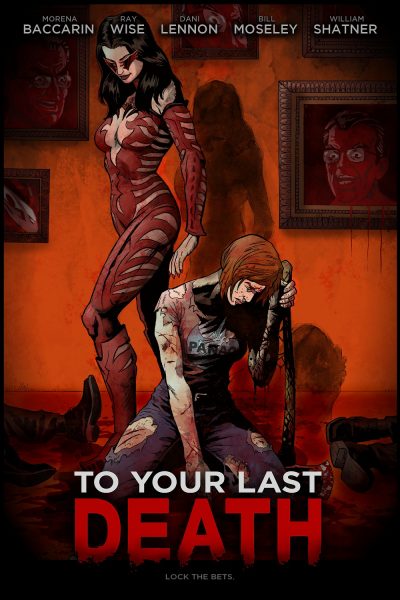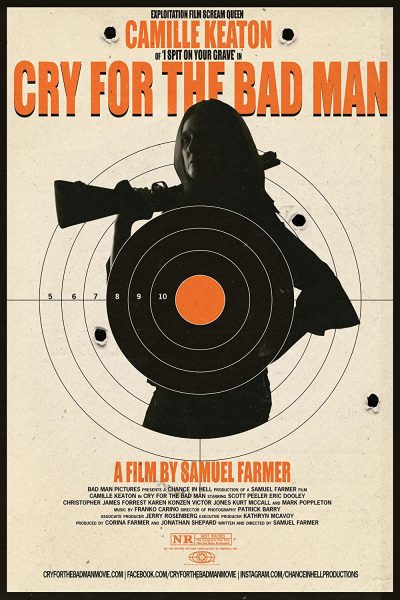★★
“Tolerable only in small doses.”
 There’s an interesting tweak to the situation here. While it is the usual “hitwoman agrees to go on one last mission” plotline, Rosa (Gala) is an assassin who has adopted poison as her weapon of choice. I think it’s the first time I’ve seen this, and it’s interesting because women are, in reality, considerably more likely to kill in that way [Per the Washington Post, “Women are seven times as likely as men to choose poison as their murder weapon”] Her choice dates back to Rosa’s childhood, when she killed her abusive father and complicit mother with belladonna berries from their own garden, and has gone on to choose this as a career, working for… Well, it’s a bit vague. Some kind of British intelligence group, I think, with her boss being Henry Crowford (Giblin).
There’s an interesting tweak to the situation here. While it is the usual “hitwoman agrees to go on one last mission” plotline, Rosa (Gala) is an assassin who has adopted poison as her weapon of choice. I think it’s the first time I’ve seen this, and it’s interesting because women are, in reality, considerably more likely to kill in that way [Per the Washington Post, “Women are seven times as likely as men to choose poison as their murder weapon”] Her choice dates back to Rosa’s childhood, when she killed her abusive father and complicit mother with belladonna berries from their own garden, and has gone on to choose this as a career, working for… Well, it’s a bit vague. Some kind of British intelligence group, I think, with her boss being Henry Crowford (Giblin).
Rosa’s latest mission takes her to Barcelona, where someone recently hijacked all the TV channels, to broadcast a message of peace and love. Needless to say, the authorities aren’t having that, so send Rosa – who is keen to retire – to track down and eliminate this threat to the established order. Helping her is Will Gray (Vinnicombe), a former army intelligence officer turned fixer. But as Rosa tries to get closer to the pirate of the high frequencies, things get considerably murkier, as it appears that he is another spook, supposedly killed in action. Meanwhile, Crowford’s boss (Charles) is getting increasingly antsy about her lack of progress, and sends another operative after her, to tie up the loose end she increasingly appears to represent.
Retitled from The Vibe, for entirely understandable commercial reasons, this is also known as – and you’ll be forgiven a derisive snort at this – Impossible Mission. But I’m going by the title under which I saw the movie on Amazon Prime. It starts promisingly enough, and does a good job of capturing the complex and paranoid worlds of both intelligence activities and conspiracy theorists, in which no-one can be trusted. However, it has no clue what to do with its concepts, and gets increasingly bogged down in far too much chit-chat. Not helping matters here, is the number of people, led by Gala, who are clearly not speaking their mother tongue, e.g. pronouncing “arsenic” as “ar-SEN-ic”.
Rosa does very little in the way of spycraft, and doesn’t put her toxic talents to any use in pursuit of her target. Certainly, the cover is entirely inaccurate, since I don’t recall her even picking up a gun. By the end, writer-director Gambino has painted himself into such a corner, there’s apparently no way to escape, and the film simply ends, without any of the major topics, least of all Rosa’s status, achieving resolution. I did keep watching, though must confess this was partly due to the over-enthusiastic closed captioning (which I turned on, since I was treadmilling at the time, and hence wheezing loudly). It describes the soundtrack in terms including “vexed music”, “maleficent music” and, my personal favourite, “dreadful music”. That this was the most consistent source of entertainment throughout, tells you everything you need to know.
Dir: Gilles Gambino
Star: Jimena Gala, Ben Vinnicombe, James Giblin, Leslie Charles
a.k.a. The Vibe






 Mel (Cooper) is engaged on a project of running the Appalachian Trail (or a convincing facsimile thereof), with some help from her sister, who meets her at various points to provide support and fresh supplies. Mel is currently on her own, starting an eight-day section of the hike where she’ll be out of contact. However, she bumps into a couple of suspicious characters, deep in the woods: Wayland (Leonard) and his partner, Jared (Woods). Initially, it seems like a creepy, but one-off random meeting. It turns out to be considerably more and subsequent encounters escalate, until Mel is sent plummeting over the edge of a drop-off, badly injuring her leg, but in possession of something very important to Wayland and Jared. Will she be able to escape her pursuers and make it to safety?
Mel (Cooper) is engaged on a project of running the Appalachian Trail (or a convincing facsimile thereof), with some help from her sister, who meets her at various points to provide support and fresh supplies. Mel is currently on her own, starting an eight-day section of the hike where she’ll be out of contact. However, she bumps into a couple of suspicious characters, deep in the woods: Wayland (Leonard) and his partner, Jared (Woods). Initially, it seems like a creepy, but one-off random meeting. It turns out to be considerably more and subsequent encounters escalate, until Mel is sent plummeting over the edge of a drop-off, badly injuring her leg, but in possession of something very important to Wayland and Jared. Will she be able to escape her pursuers and make it to safety? Stacey Anderson (Sturman) is an agent for the CIA. When an operation in Tunis goes bad, she is blamed, and the intelligence which was supposed to have been collected – a complete list of Russian assets – goes missing. Stacey is disavowed by the organization, and dumped out, with a new identity. Five years later, she’s a saleswoman for a PR company, and her boyfriend, Ken (Haymes) has just proposed, when Stacey’s old life comes back to haunt her. An assault on her workplace shows that someone clearly believes she knows more about the list than she admitted. She is forced on the run, with Ken, while she tries to figure out whether it’s the Russians, or a rogue faction within her former employers. Fortunately, this wasn’t entirely a surprise, and Stacey is quite well-prepared. Less expected: having to take her new fiance along with her.
Stacey Anderson (Sturman) is an agent for the CIA. When an operation in Tunis goes bad, she is blamed, and the intelligence which was supposed to have been collected – a complete list of Russian assets – goes missing. Stacey is disavowed by the organization, and dumped out, with a new identity. Five years later, she’s a saleswoman for a PR company, and her boyfriend, Ken (Haymes) has just proposed, when Stacey’s old life comes back to haunt her. An assault on her workplace shows that someone clearly believes she knows more about the list than she admitted. She is forced on the run, with Ken, while she tries to figure out whether it’s the Russians, or a rogue faction within her former employers. Fortunately, this wasn’t entirely a surprise, and Stacey is quite well-prepared. Less expected: having to take her new fiance along with her.
 Miriam DeKalb (Lennon) and the rest of her siblings are estranged from their arms dealer father, Cyrus (Wise), after their exposure of his dysfunctional nature ended his political career. Which is why it’s a surprise when they are all invited to his company’s headquarters. It doesn’t end well, with most of them murdered. and Miriam – found at the scene with an ax – tagged as their killer. However, she gets a second chance when visited in hospital by a mysterious figure called the Gamesmaster (Baccarin), who makes Miriam an offer. She’ll get to go back in time 24 hours, knowing what she does now. Will she be able to do better? For the GM runs an event on the astral plane (or somewhere), in which entities bet on the outcome of humans given a second chance at a pivotal moment, and Miriam is her latest subject. So can she change the outcome?
Miriam DeKalb (Lennon) and the rest of her siblings are estranged from their arms dealer father, Cyrus (Wise), after their exposure of his dysfunctional nature ended his political career. Which is why it’s a surprise when they are all invited to his company’s headquarters. It doesn’t end well, with most of them murdered. and Miriam – found at the scene with an ax – tagged as their killer. However, she gets a second chance when visited in hospital by a mysterious figure called the Gamesmaster (Baccarin), who makes Miriam an offer. She’ll get to go back in time 24 hours, knowing what she does now. Will she be able to do better? For the GM runs an event on the astral plane (or somewhere), in which entities bet on the outcome of humans given a second chance at a pivotal moment, and Miriam is her latest subject. So can she change the outcome? For the first, perhaps, three-quarters, this feels almost more like a Lifetime Original Movie. Then, at the end… Hoo-boy. But let’s not get ahead of ourselves, shall we? It begins with Nina (Orlan), seeking to escape a fraught life in Russia, for her and her young daughter, Dasha (Pimenova). Through an online dating service, she meets Karl Frederick (Bernsen), and they eventually move to America to be with him. While he’s an older gentleman, initially they seem to have struck it lucky, for he’s a rich, retired surgeon, who owns a massive estate in the country. In fact, you could say it seems almost too good to be true…
For the first, perhaps, three-quarters, this feels almost more like a Lifetime Original Movie. Then, at the end… Hoo-boy. But let’s not get ahead of ourselves, shall we? It begins with Nina (Orlan), seeking to escape a fraught life in Russia, for her and her young daughter, Dasha (Pimenova). Through an online dating service, she meets Karl Frederick (Bernsen), and they eventually move to America to be with him. While he’s an older gentleman, initially they seem to have struck it lucky, for he’s a rich, retired surgeon, who owns a massive estate in the country. In fact, you could say it seems almost too good to be true… This opens and closes with footage and photographs of the real Michelle Payne, who is the subject of the film. Part of me wonders if that documentary approach might have proved a more successful one, rather than the parade of sports drama cliches we get here. Admittedly, quite a lot of them are based in fact. Payne was the first woman to ride to victory in the Melbourne Cup – that’s Australia’s premier horse-race, roughly equivalent in prestige to the Kentucky Derby or Grand National in the US or UK respectively. This alone, is quite an achievement. But she did so as one of ten brothers and sisters, who largely had to bring themselves up after their mother died when Michelle was only six months old. Her father was a horse trainer, and no fewer than
This opens and closes with footage and photographs of the real Michelle Payne, who is the subject of the film. Part of me wonders if that documentary approach might have proved a more successful one, rather than the parade of sports drama cliches we get here. Admittedly, quite a lot of them are based in fact. Payne was the first woman to ride to victory in the Melbourne Cup – that’s Australia’s premier horse-race, roughly equivalent in prestige to the Kentucky Derby or Grand National in the US or UK respectively. This alone, is quite an achievement. But she did so as one of ten brothers and sisters, who largely had to bring themselves up after their mother died when Michelle was only six months old. Her father was a horse trainer, and no fewer than  Despite a very brief running time of only 70 minutes, this still manages to seem talky and overlong. That’s a shame, as it manages to waste a good performance from a genre veteran, playing an action heroine who is not your typical one. The former is Camille Keaton, who is having a bit of a B-movie renaissance in her career, forty years after starring in the notorious rape-revenge film, I Spit on Your Grave. And the latter? Well, Keaton is now in her seventies, but based on this, is still capable of wielding a mean shotgun. And clearly, of taking no shit from anyone. Indeed, you could almost read this as the sundown years of her Grave character, Jennifer Hills.
Despite a very brief running time of only 70 minutes, this still manages to seem talky and overlong. That’s a shame, as it manages to waste a good performance from a genre veteran, playing an action heroine who is not your typical one. The former is Camille Keaton, who is having a bit of a B-movie renaissance in her career, forty years after starring in the notorious rape-revenge film, I Spit on Your Grave. And the latter? Well, Keaton is now in her seventies, but based on this, is still capable of wielding a mean shotgun. And clearly, of taking no shit from anyone. Indeed, you could almost read this as the sundown years of her Grave character, Jennifer Hills. There are times when I am bracing myself, going into a movie. Here’s the synopsis for this one: “A transgender teenage girl on summer vacation in Los Angeles fights to survive after she falls in with four queer feminist vampires, who try to rid the city’s streets of predatory men.” Given my long-standing aversion to message movies, this seemed like 90 minutes of my worst nightmare. What had I let myself in for? But this proved to be surprisingly accessible – even for those of us who are neither transgender nor queer, and are enrolled in the Camille Paglia school of feminism.
There are times when I am bracing myself, going into a movie. Here’s the synopsis for this one: “A transgender teenage girl on summer vacation in Los Angeles fights to survive after she falls in with four queer feminist vampires, who try to rid the city’s streets of predatory men.” Given my long-standing aversion to message movies, this seemed like 90 minutes of my worst nightmare. What had I let myself in for? But this proved to be surprisingly accessible – even for those of us who are neither transgender nor queer, and are enrolled in the Camille Paglia school of feminism.